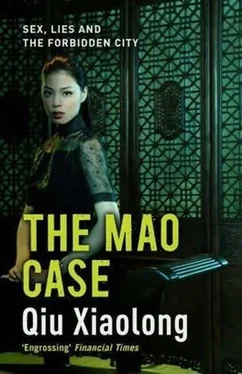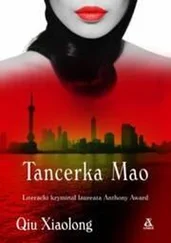“Did they find anything?”
“No. Huang helped make up an interview list, but it wasn’t used. Tan died, and Qian almost died, lying delirious in a hospital bed for days. So the group gave up and went back to Beijing.”
It was now like an oven in the train toilet, though the sun had long gone down.
“Huang tried to remember the interview list, but with no success,” Yu went on. “It happened so many years ago, and there is no record of it anywhere. As far as he could remember, the list included some people from the circle Qian moved in, before the outbreak of the Cultural Revolution, and from the middle school Tan graduated from. One of them seen with him shortly before his attempt to flee to Hong Kong, and another one was also from a black family background. I went one step further and checked into the Great Leap Forward Middle School. I talked to a retired teacher who had taught Tan. According to him, one of Tan’s close friends was Xie -”
“What do you know about Xie, Detective Yu?”
“Well, Old Hunter followed Jiao to Xie Mansion. So he must be connected to the case, I guess.”
In spite of his warning, Detective Yu had moved ahead on his own, which Chen should have anticipated. But the information just obtained by his capable partner could prove to be crucial. It put Xie into the perspective, as someone who, to say the least, had been withholding information.
“The information about Xie is important. But remember, you and Old Hunter keep your hands off him. I’m on my way back to Shanghai. We have to discuss Xie before anyone makes a move. Now, have you found anything else out about Song’s death?”
The door handle started rattling. Someone waiting outside was impatient.
“Nothing. But I got the name of his replacement, Liu, and Liu’s cell number, Chief.”
“That’s great.” Chen put the number into his phone. “I’ll call you when I’m back in Shanghai.”
Chen decided to make a phone call to Liu, in spite of the raging door handle. A short call.
“Liu, I’m Chen Cao.”
“Oh, Chief Inspector Chen! Where have you been?”
“I’m on the train back to Shanghai. Meet me in the train station around eight in the morning,” he said without answering Liu’s question, and then added, “I was sick.”
Hanging up, he finally walked out of the toilet. A giant of a man with a large beard glared at him, hurried in, and slammed the door behind him.
There was a pleasant breath of wind streaming in from the crevice of the door. But he had to squeeze back to his seat. A middle-aged, stout woman was sitting on the floor with her legs stretched out in front, and her small daughter, behind her in a similar position, their backs supporting each other. Chen had to step carefully, high lifting his feet.
Edging near to his seat, he was surprised to see an elderly woman seated there, with her face resting flat on the small table. She had to be in her seventies or eighties, dressed in black homespun, her silver hair shining. Possibly one of the passengers from Tianjin, who had taken the seat during his phone call.
“She didn’t understand my words,” the young girl murmured apologetically, who might have tried to speak up for Chen, but to no avail.
“Call the conductor over,” the man sitting opposite said. “That’s against the rules.”
The conductor was supposed to drag the black-attired woman away, who mumbled something indistinct in response to him, sitting there without budging, like a rock.
“It would be hard for her to stand throughout the night,” a passenger across the aisle said.
“That can’t be helped,” the conductor said, beginning to push at the old woman. “Rules are rules. There’s a sleeping berth available. An upper berth. One can go there by paying the extra.”
“A sleeping berth,” Chen said. It could have become available when someone got off in Tianjin. “I’ll take it.”
“Two hundred yuan extra,” the conductor said. “Far more comfortable. That will solve the problem for a Big Buck like you. You don’t have too much luggage, do you?”
“No, I don’t have much luggage, but you may take the old woman there. I’ll pay for it. I like the seat here.”
The couple opposite eyed him in surprise. Chen took out two one-hundred-yuan bills. The old woman turned out not to be that hard of hearing. She rose without further invitation. The conductor, relieved to get the matter over with, led her away without further ado.
“Not too many people want to learn from Comrade Lei Feng anymore,” the man across the aisle commented. “It’s not Mao’s time.”
Chen took his seat against the window without response. With an upper berth in a sleeping car, it would be more difficult for him to climb up and down in case of another phone call. His decision had nothing to do with a model of selflessness like Lei Feng during Mao’s time. Even though he was burdened with a Mao case.
“You must be somebody,” the girl said, sitting close, “but you ate instant noodles instead of going to the dining car.”
“Oh, I like the instant noodles.” He smiled a self-deprecating smile. In today’s society, an instant-noodles-eater on a hard seat was nobody, incapable of paying an extra two hundred yuan for himself, let alone for someone else. The gap between the rich and the poor was an appalling given, but even more appalling was people’s reaction. In Mao’s time, it was supposed to be an egalitarian society, at least in theory. Chen was disturbed. “It’s nothing but a business expense – I mean, the ticket.”
It wasn’t exactly true. He might not have the train ticket reimbursed. Still, two hundred yuan wouldn’t worry him.
The night lights went on in the train. The couple opposite closed their eyes, leaning against each other. The car gradually became quiet. Chen gazed at his reflection in the window, reflecting on the countryside in darkness.
Beijing was left far, far behind.
Drunk, I whipped an invaluable horse; / I’m worried about burdening a beauty with too much passion. The two lines by Daifu came unexpectedly back to his mind. Years earlier, a friend of his had once copied the couplet for him in a paper fan, which he had lost. And he hadn’t even given Ling a call before leaving Beijing, he realized, with a wave of guilt.
But then his thoughts wandered off to another poem Mao had written for Yang in their youth:
Waving my hand, I am leaving. / Unbearable for us to stand / looking at each other, inconsolably. / Our sufferings told over and again, / your eyes brimming with sorrow, / holding back tears with difficulty. / You still misunderstand my letter, / but it will pass / like cloud and mist. / You alone understand me in this world./ Oh my heart aches, / does the heaven know?
Chen didn’t like that poem, which was full of clichés. And it was still hard for him to understand how Mao could have been so callous to Yang, and to his other women.
The ringing of his phone broke into his musing. It was Old Hunter. Chen glanced at the girl beside him, who, too, was dozing, with her mouth slightly open.
Chen decided not to get up this time. A couple of fragmented sentences out of context might not be comprehensible to one who overheard them.
“Oh, I’m on the train coming back to Shanghai. A crowded train, a lot of people sitting and standing around,” he said, making sure the retired cop would get the hint.
“I went to see her maid.” Old Hunter went straight to the point, in sharp contrast to his characteristic Suzhou opera way. “Her name is Zhong.”
“Her maid?” It must have been Shang’s maid, Chen realized. “Oh I see. That’s great. Did you learn anything from her?”
“Xie visited Jiao at her orphanage. According to Zhong, he helped a lot financially.”
Читать дальше












